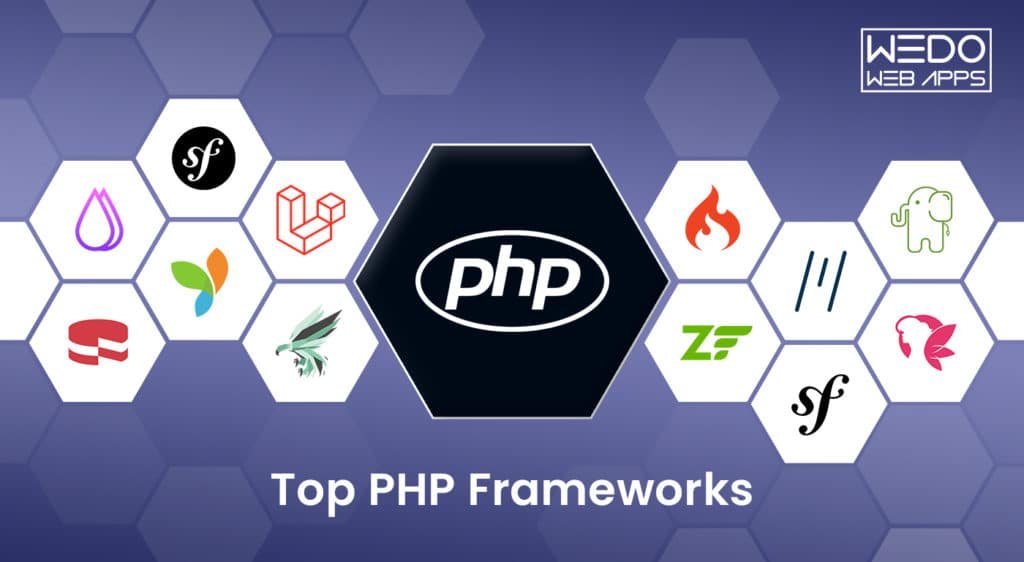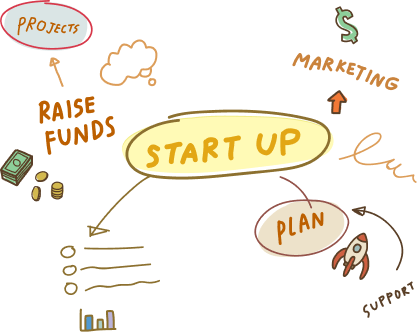31 Oct, 2023 | Custom Php Development
12 Top PHP Frameworks for Web Developers in 2023: A Comprehensive Guide

Why Should You Use a PHP Framework?
PHP frameworks offer a structured approach to web development, and they come with a multitude of advantages:1. Cost Savings:
PHP frameworks provide pre-built, reusable components, which can significantly reduce development costs. By leveraging these components, developers can avoid reinventing the wheel and expedite project completion.2. Time Efficiency:
Developers can save precious time by utilizing the best PHP frameworks around. These frameworks come equipped with tools and libraries that streamline common development tasks, thus expediting project delivery.3. Scalability:
Most PHP frameworks are highly scalable, allowing applications to grow seamlessly as user demands increase. They offer the flexibility needed to support scaling efforts effectively. Now that we've established the value of PHP frameworks, let's explore what you should look for when selecting the right one for your project.Key Considerations When Choosing a PHP Framework
Choosing the ideal PHP programming language framework involves careful consideration of various factors. Consider these important factors:1. Project Requirements and Scope:
Select a PHP framework that aligns with your project's specific requirements and scope. Smaller projects may benefit from lightweight frameworks, while larger or more complex endeavors may demand more feature-rich options.2. Learning Curve and Developer Familiarity:
Consider your team's familiarity with a particular framework. Sticking with a familiar framework can boost productivity, but exploring new frameworks can bring fresh perspectives and innovative features.3. Community Support and Documentation:
Opt for frameworks with active communities and comprehensive documentation. Strong community support ensures access to guidance and resources, making your development journey smoother.4. Security Features:
Security is paramount in web development. Check if the framework incorporates security best practices and provides built-in features to guard your web server against common vulnerabilities like SQL injection and XSS attacks.5. Performance Optimization:
Evaluate the performance characteristics of each framework. Some, like Phalcon, are known for their speed due to their unique architecture.12 Top PHP Frameworks for 2023
1. Laravel
Laravel continues to shine as one of the most popular PHP frameworks. It offers an elegant syntax and a rich feature set, including an expressive ORM system and a powerful templating engine called Blade. Laravel is perfect for rapid web application development.2. Symfony
Symfony is a renowned PHP framework celebrated for its exceptional performance and modularity. It provides reusable PHP components and libraries, allowing developers to pick and choose what they need for their projects. Symfony is versatile and suits a wide range of applications.3. CodeIgniter
CodeIgniter is a lightweight PHP framework that emphasizes simplicity and performance. It boasts a small footprint and straightforward configuration, making it an excellent choice for rapid development without unnecessary overhead.4. Yii
Yii, short for "Yes, it is!", is a high-performance, component-based PHP framework. It offers features like database abstraction, form validation, and authentication, making it an attractive option for web developers.5. Phalcon
Phalcon stands out due to its unique architecture implemented as a C-extension. This design makes it one of the fastest PHP frameworks available. If speed is a priority, Phalcon is an excellent choice.6. Slim
Slim is a micro PHP framework that prioritizes simplicity and minimalism. It's ideal for building RESTful APIs and small to medium-sized web applications. Slim's lightweight nature allows developers to have full control over their project's components.7. Laminas
Formerly known as Zend Framework, Laminas is a collection of professional PHP packages that can be used independently or together. It emphasizes best practices for security and performance, making it a robust choice.8. CakePHP
CakePHP offers a convention-over-configuration approach to development. It features scaffolding for rapid application prototyping and is known for its ease of use, making it suitable for both beginners and experienced developers.9. FuelPHP
FuelPHP is a flexible and extensible PHP framework that offers features like HMVC (Hierarchical Model-View-Controller) and a comprehensive package management system. It's designed to be modular and easy to extend.
10. Symfony Flex
Symfony Flex is a micro-framework based on the Symfony components. It's designed for developing microservices and lightweight applications. Its flexibility and simplicity make it a contender in the world of microframeworks.11. Zend Framework
Zend Framework, now known as Laminas, provides a collection of packages for building robust and secure web applications. It follows the best practices of PHP development and offers extensive features for enterprise-level projects.12. PHPixie
PHPixie is a high-performance PHP framework designed for social networking websites. It follows the HMVC architectural pattern and provides standard ORM, input validation, authentication, and caching capabilities. PHPixie is known for its speed and simplicity. The choice of a PHP framework can significantly impact your web development projects in 2023. Each of the 12 PHP frameworks mentioned here has its strengths and is suited for different types of projects and developer preferences. As you embark on your journey to select the ideal framework for PHP language programming, consider your project's requirements, your team's expertise, and the factors outlined in this guide. This thoughtful selection process will lead you to the PHP framework that best aligns with your specific needs, ensuring a successful development experience in 2023. Stay informed about the latest trends and advancements in PHP and its frameworks as the web development landscape continues to evolve. Armed with this knowledge, you'll be well-prepared to create innovative and efficient web applications in the years ahead. Now, it's time to pick the best PHP framework that suits your next web development adventure. Happy coding! Read also: PHP Laravel Framework: Advantages and FeaturesAdditional Considerations When Choosing a PHP Framework
In addition to the key factors mentioned earlier, there are some additional considerations that can influence your choice of a PHP framework for your web development project in 2023.1. Front-end Integration:
Consider how well the PHP framework integrates with front-end technologies. Many modern web applications rely on JavaScript frameworks like React, Vue.js, or Angular for the user interface. Ensure that your chosen PHP framework supports seamless integration with these front-end technologies to create dynamic and responsive web applications.2. Template Engine:
A robust template engine can simplify the process of creating and managing views in your web application. Some PHP frameworks, like Laravel, come with powerful template engines (Blade, in Laravel's case) that facilitate the creation of reusable and elegant views.3. Database Support:
Different projects may require different database systems, such as MySQL, PostgreSQL, or MongoDB. Check if the PHP framework you're considering offers support for the database system that aligns with your project's needs. Most PHP frameworks provide excellent database abstraction layers to streamline database operations.4. RESTful API Development:
If your project involves building RESTful APIs, make sure the PHP framework provides the necessary tools and conventions for API development. Frameworks like Symfony and Laravel excel in this regard, offering features for building RESTful APIs with ease.5. Testing and Debugging Tools:
Robust testing and debugging tools are essential for ensuring the quality and reliability of your web application. Look for PHP frameworks that support testing methodologies like unit testing and provide debugging tools to simplify error identification and resolution.6. Performance Optimization:
Performance is a critical aspect of web development. Some top 10 best PHP frameworks are known for their exceptional performance optimization features. Consider the scalability and caching mechanisms offered by the framework to ensure your application performs well under heavy loads.Common Concerns and Misconceptions About PHP Frameworks
Before making your final decision, let's address some common concerns and misconceptions about PHP frameworks:1. Learning Curve:
Some developers worry about the steep learning curve associated with new PHP frameworks. While it's true that learning a new framework takes time, the investment often pays off in increased productivity and improved code quality. Many frameworks offer extensive documentation and tutorials to help developers get up to speed quickly.2. Flexibility vs. Convention:
PHP frameworks strike a balance between convention and flexibility. Some developers fear that frameworks might impose too many constraints on their projects. However, most frameworks allow you to customize and override default behaviors, giving you the flexibility to tailor your application to your specific requirements.3. Framework Size:
Concerns about the size of a framework and its impact on application performance are valid. However, most modern PHP frameworks are designed to be lightweight and load only the components you need for your project. This ensures that your application remains efficient and responsive.Advantages of Using PHP Frameworks
PHP frameworks offer several advantages that can significantly streamline the web development process and improve the quality of your projects. Here are some key benefits of using PHP frameworks for web development:1. Rapid Development:
PHP frameworks come with pre-built components and libraries, which can save developers a substantial amount of time. These components handle routine tasks, such as user authentication, form validation, and database operations, allowing developers to focus on building unique features.2. Code Reusability:
PHP frameworks promote the reuse of code. Developers can create custom components, modules, or libraries and easily integrate them into multiple projects. This not only saves time but also ensures consistency across different applications.3. MVC Architecture:
The majority of PHP frameworks adhere to the Model-View-Controller (MVC) architectural design. The MVC framework separates the application into three components, making it easier to manage and maintain code. It enhances code organization and facilitates collaboration among developers.4. Security:
Security is paramount for web applications. Check if the framework follows best practices for security and offers built-in features for protection against common vulnerabilities in web apps like SQL injection and cross-site scripting (XSS).5. Scalability:
Consider the scalability of your application. Will it need to handle a growing number of users and data? Frameworks like Laravel and Symfony are known for their scalability, making them suitable choices for large-scale projects.6. Community and Support:
A strong community and active support are essential for the long-term success of a framework. Look for frameworks with active communities, well-documented resources, and regular updates. This ensures you'll have access to assistance when needed and that your framework will stay up-to-date with security patches.7. Modularity:
PHP frameworks are often modular, allowing you to choose and integrate only the components other frameworks and libraries you need for your project. This flexibility ensures that your application remains lightweight and efficient.8. Licensing:
Check the licensing terms of the framework. Most PHP frameworks are open-source and free to use, but it's essential to ensure that the license aligns with your project's goals and requirements.9. Future-Proofing:
Consider the long-term viability of the framework. Is it currently being updated, and is there a clear plan for its future development? Choosing a framework with a clear future ensures that your project remains supported and up-to-date. Certainly, let's add a section about the disadvantages of using PHP frameworks, incorporating the specified keywords:Disadvantages of Using PHP Frameworks
While PHP frameworks offer numerous advantages, it's essential to be aware of their limitations and potential drawbacks. Here are some of the disadvantages associated with using PHP frameworks:1. Learning Curve:
Learning to use a PHP framework effectively can take time, especially for developers who are new to the framework. The complexity of some frameworks may pose challenges for beginners.2. Overhead:
PHP frameworks come with a set of pre-built components and libraries, which can be beneficial for rapid development. However, these components may introduce overhead, increasing the size of the application.3. Performance Impact:
Some PHP frameworks, while feature-rich, can have a performance impact due to the additional layers of abstraction they introduce. Developers should carefully consider the performance requirements of their projects.4. Flexibility Trade-Offs:
The modularity and extensibility of PHP frameworks can sometimes lead to a trade-off in terms of flexibility. While frameworks offer predefined structures, they may not accommodate unconventional project requirements easily.5. Learning Specific Frameworks:
Developers who specialize in one PHP framework may find it challenging to switch to another. Learning the intricacies of a specific framework can limit versatility.6. Debugging Complexities:
Debugging applications built on PHP frameworks can be more complex than debugging plain PHP code, particularly when issues arise within the framework's core or components.7. URL Routing Constraints:
Some PHP frameworks impose URL routing constraints, which may not align with the project's desired URL structure. This can require workarounds or custom routing solutions.8. Resource Consumption:
Frameworks that employ complete object-oriented approaches may consume more memory and resources compared to simpler PHP solutions.
9. Code Generation Tools:
While code generation tools can expedite development, they may generate code that is less efficient or optimized compared to hand-written code.10. Compatibility and Updates:
It's important to note that the disadvantages mentioned above may vary depending on the specific PHP framework chosen and the project's requirements. Developers should carefully assess the trade-offs and select a framework that aligns with their development goals and constraints.Conclusion
In the ever-evolving world of web development, selecting the right PHP framework for your projects in 2023 is a critical decision. It can significantly impact your development speed, code quality, and the overall success of your web applications. By carefully evaluating your project's requirements, considering factors such as community support, security, and scalability, and keeping in mind the additional considerations and common concerns mentioned above, you'll be well-equipped to make an informed choice. Remember that the choice of a PHP framework is not one-size-fits-all. Each framework has its strengths and is suitable for different types of projects and developer preferences. The key is to match the framework's capabilities with your project's needs and your team's expertise. As you embark on your web development journey in 2023, armed with the knowledge gained from this comprehensive guide, you'll be better prepared to create innovative and efficient web applications that meet the demands of the modern digital landscape. Happy coding, and may your web development endeavors in 2023 be both successful and rewarding!What is a PHP framework?
A PHP framework can help develop websites using the PHP framework. The framework PHP has a library of commonly used functions that helps to save developers time when writing a new project or developing a new one. PHP framework is an easy to learn web application development framework in PHP.Which framework uses PHP?
11 PHP Frameworks For Developing Web Sites Laravel. Code igniters. Symfony. Lamina projects. Phalcon. Cake Phoenix. Yiii. Fuel PHPs.What is the different PHP framework?
PHP framework with excellent extensibility to develop scalable and robust web applications. Code Igniter — an extremely popular PHP framework with MVC support. Symfony is a modular PHP platform containing an integrated debugging and documentation system.What is the MVC framework in PHP?
MVC is a design pattern in which an application has two major parts. This split allows more code structure and the possibility of changing applications in an application while still not changing the whole code structure.Frequently Asked Questions
Laravel is an excellent PHP web framework that provides excellent extended functionality for the development of excellent applications. Code Igniter – an incredibly popular PHP framework that supports MVC and is perfect for lightweight web applications. Symfony – a modular PHP framework featuring a debugging module.
Laravel is an open source PHP framework that uses Java. It offers web developers tools to create web apps using PHP technologies.
Advanced PHP is used for sessions, cookies, databases and File handling. Customization means changing existing codes if customers want them. MVC translates to ModelView control. The framework makes applications easier and safer.
Phalcon is a free-source PHP Framework written using C programming languages. Using this Framework is incredibly simple because it combines PHP classes and namespaces. Phalcon provides PHP as a framework for fast development. It is extremely light and is based on MVC architectures. MVC is designed as a model. These concepts are separate from data processing and presentation.
Laravel provides an excellent framework for PHP development for all types of users. Taylor Otwell developed the framework from 2011 to 2012 and is the best-known free PHP framework. It has a security feature that handles secure applications and has an extremely quick response time.

